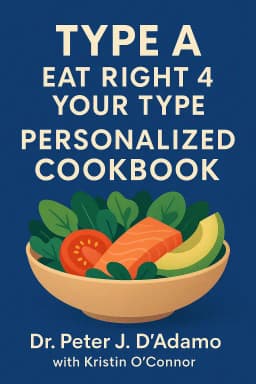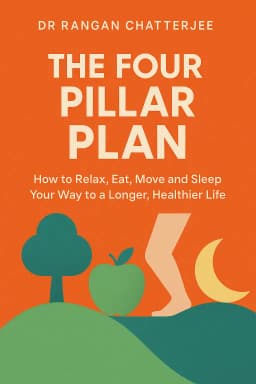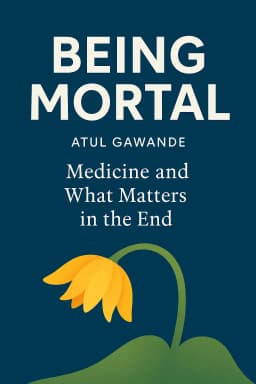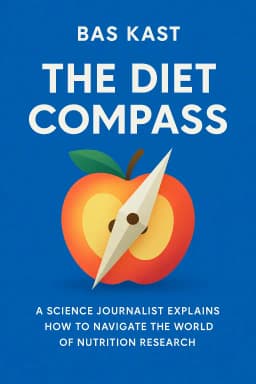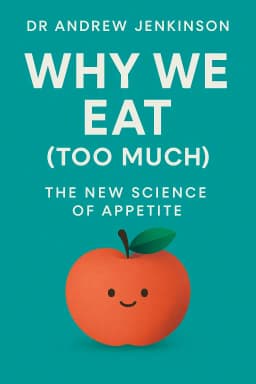
The Calorie Lie
The New Science of Appetite
Golden Hook & Introduction
SECTION
Laura: Most of us think obesity is caused by eating too much. But what if the truth is the other way around? What if obesity is what causes us to eat too much? That's the radical idea we're exploring today. Sophia: That sounds like a riddle. How can obesity cause overeating? It feels like you’re putting the cart before the horse. Laura: It does, but it’s the central, and highly persuasive, argument in the book Why We Eat (Too Much): The New Science of Appetite by Dr. Andrew Jenkinson. It’s a book that has been widely acclaimed, and for good reason. It completely reframes the conversation. Sophia: And what's fascinating is that Dr. Jenkinson isn't just a theorist writing from an ivory tower. He's a bariatric surgeon in London who has treated thousands of patients. He wrote this book because he saw firsthand that the standard 'eat less, move more' advice was failing the very people he was trying to help. Laura: Exactly. He saw their struggle, listened to their stories of feeling trapped, and realized the conventional wisdom had to be wrong. And his search for an answer all starts with one core idea that completely flips the script on dieting.
The Body's Secret Thermostat: Debunking the Calorie Myth with the Weight Set-Point
SECTION
Laura: Jenkinson argues that our bodies operate with something called a 'weight set-point.' Think of it like the thermostat in your house. You set it to 70 degrees, and the system works automatically to keep it there. If it gets too cold, the heat kicks on. If it gets too hot, the AC starts. Your body does the same thing with weight. Sophia: Okay, I can see the analogy. But that also sounds a little… fatalistic. Are you saying we have no control? What about personal responsibility, exercise, all of that? It feels a bit like a free pass. Laura: That's the exact criticism some people have of this theory—that it’s too deterministic. But Jenkinson provides some powerful, and frankly, heartbreaking evidence. Let's talk about the study on the contestants from the TV show The Biggest Loser. Sophia: Oh, I remember that show. It was huge. People losing incredible amounts of weight through sheer grit and determination. It was meant to be so inspirational. Laura: It was. On the show, the contestants lost an average of 58 kilograms—that's over 9 stone. A monumental achievement. But researchers at the National Institutes of Health decided to follow up with fourteen of them six years later. And the results were devastating. Sophia: I have a bad feeling about this. Laura: You should. Six years later, all but one had regained a significant amount of weight. On average, they had put back on 41 of the 58 kilos they’d lost. But here's the truly shocking part. At the end of the show, their metabolisms had slowed down dramatically. They were burning about 600 fewer calories a day than you'd expect for someone their size. Sophia: Wow. So their bodies were already fighting back. Laura: Viciously. And it gets worse. Six years later, even after regaining most of the weight, their metabolisms hadn't recovered. In fact, they had slowed down even further. They were burning over 700 fewer calories a day than before they even started the show. They were trapped in a metabolic prison. Sophia: That’s just… cruel. It completely reframes those shows. You’re watching people win a battle, but you don't see them lose the war against their own biology. Laura: Precisely. Their subconscious brain, the thermostat, was fighting to get back to its set-point. And this isn't a new discovery. The famous Minnesota Starvation Experiment from the 1940s showed the same thing. When volunteers were semi-starved, their bodies adapted. Their metabolism plummeted, they became obsessed with food, they were depressed and anxious. Their bodies were defending their weight. Dieting, in the brain's view, is just a self-imposed famine. Sophia: So when you're on a diet, you're not just fighting a craving for a cookie. You're fighting your entire evolutionary survival mechanism. Laura: You are fighting a system designed to keep you alive. And as Jenkinson says, in the long run, the subconscious brain almost always wins.
Survival of the Fattest: Our Genetic and Epigenetic Inheritance
SECTION
Sophia: That makes me wonder, then, why do some people seem to have such a high set-point to begin with? Is it just random, or is there a reason my thermostat is set to 'cozy' and someone else's is set to 'tropical'? Laura: That's the next layer of the puzzle. Jenkinson argues it's a combination of our genetics and our history. He talks about the 'thrifty gene' hypothesis. For most of human history, famine was a constant threat. Individuals who were better at storing fat during times of plenty were more likely to survive the lean times and pass on their genes. Sophia: Right, so a gene that was a lifesaver for our ancestors becomes a liability when there's a 24-hour convenience store on every corner. Laura: Exactly. And there's a perfect, tragic example of this in the book: the Pima tribe. For centuries, the Pima people lived in Mexico, farming and enduring periods of hardship. They developed a very 'thrifty' genetic profile. Today, the Pima who still live in Mexico and eat a traditional diet are lean and healthy. Sophia: And the ones who don't? Laura: The other half of the tribe was displaced to a reservation in Arizona, where they were introduced to a Western diet of processed foods—white flour, sugar, vegetable oils. Today, they have one of the highest rates of obesity and type 2 diabetes in the world. Same genes, different environment. The genes that were once their strength became their weakness. Sophia: That's incredible. It's like their bodies are still programmed for a famine that never comes. But what about people without that specific genetic history? Laura: This is where it gets even more fascinating. It's not just the genes you inherit, but how they're expressed. Jenkinson brings up the concept of epigenetics. Sophia: Hold on, 'epigenetics.' That's a big word. Can you break that down for me? Laura: Think of your DNA as the hardware in a computer. It's fixed. Epigenetics is like the software. It's a layer of instructions on top of your DNA that tells your genes whether to switch on or off. And this software can be rewritten by the environment. Sophia: How so? Laura: The most powerful example is the Dutch Famine Study. During World War II, there was a terrible famine in Holland. Researchers later studied the children of women who were pregnant during that famine. These babies were born small, but as adults, they were significantly more likely to be obese and have diabetes compared to their own siblings born before or after the famine. Sophia: Let me see if I've got this right. The mother's experience of starvation sent a signal to the baby in the womb. It was an epigenetic message that said, "The world you're about to be born into is a world of scarcity. Program your body to be incredibly efficient at storing every single calorie." Laura: You've nailed it. It's a predictive adaptation. The problem is, when that baby is born into a world of abundance, that same survival programming becomes a lifelong struggle with weight. History, quite literally, gets written onto our biology before we're even born.
The Modern Hijack: How Processed Foods and Bad Science Corrupted Our Internal Signals
SECTION
Sophia: Okay, so we have this ancient biological system, a set-point, that's been shaped by our genes and our history. But something clearly went wrong in the last 50 years or so. The obesity epidemic didn't exist in the 1950s. What happened? Laura: Jenkinson argues that our modern food environment is sending our bodies a constant, powerful, and false signal. It's always screaming, "Winter is coming! Famine is around the corner! Store fat now!" Sophia: What is this signal? What's the smoking gun? Laura: He points to two main culprits that exploded in our diets right around the time the obesity crisis began in the 1980s. The first is the 'sugar roller coaster' caused by refined carbohydrates and added sugars. The second, and perhaps more insidious, is the dramatic shift in the types of fats we eat. Sophia: Let's start with the sugar. I think we all know sugar is bad, but how does it hijack the set-point? Laura: It's all about the hormone insulin. When you eat sugar or highly refined carbs, your blood sugar spikes, and your pancreas releases a flood of insulin to deal with it. Insulin's job is to shuttle that sugar out of the blood and into cells, especially fat cells. When insulin levels are chronically high, it does two things: it locks energy away in fat cells, and it blocks the signal from leptin—the hormone that tells your brain you're full and have enough energy. Your brain thinks you're starving, so it cranks up your appetite and slows your metabolism. It raises your set-point. Sophia: Wow. So that 'healthy' low-fat yogurt that's packed with sugar is actually sending a signal to my brain to get fatter? Laura: That's the argument. And it's a direct consequence of what Jenkinson calls the 'crime story' of 20th-century nutrition. In the 1950s and 60s, there was a huge debate: what causes heart disease, fat or sugar? A scientist named Ancel Keys championed the 'diet-heart hypothesis,' blaming saturated fat. His research, particularly the Seven Countries Study, was highly influential but also deeply flawed—he cherry-picked data that supported his theory. Sophia: And the sugar industry loved this, I assume? Laura: They funded it! They paid prominent scientists to publish reviews that downplayed the dangers of sugar and pointed the finger squarely at fat. So, government guidelines told everyone to eat less fat. Food companies responded by removing fat from their products and replacing it with... sugar, to make it palatable. And they also replaced traditional fats like butter and lard with cheap, highly processed vegetable oils. Sophia: Which brings us to the second culprit. The fats. Laura: Yes. Specifically, the ratio of two essential fatty acids: omega-6 and omega-3. Our ancestral diet had a ratio of about 1-to-1. Today, thanks to the dominance of vegetable oils like soy, corn, and sunflower oil, and grain-fed livestock, the average Western diet has a ratio closer to 20-to-1. Sophia: And why is that a problem? Laura: Because this skewed ratio is a powerful pro-inflammatory signal. It also, Jenkinson argues, directly stimulates the same pathways in the brain as cannabis—the endocannabinoid system. It gives you 'the munchies,' increases appetite, and makes you crave more high-calorie food. It's another false 'famine' signal, telling your body to hoard energy.
Synthesis & Takeaways
SECTION
Sophia: Okay, let me try to put this all together. It feels like a perfect storm. Our bodies have a biological weight set-point. Our genetic history can predispose some of us to have a higher one. And our modern diet—full of sugar that spikes our insulin and processed oils that skew our omega-fatty-acid ratio—is constantly sending signals to our brain to push that set-point even higher. It's a triple threat. Laura: That's a perfect summary. And the book's ultimate message is one of empowerment through that understanding. It reframes this entire struggle. It's not a personal or moral failure. It's a biological mismatch between our ancient, survival-oriented hardware and the bizarre, obesogenic software of the modern world. Sophia: So the solution isn't to declare war on our bodies with another crash diet, which we now know just makes the problem worse. Laura: Exactly. The solution is to change the signals we're sending. The book's core takeaway is that the first step isn't counting calories; it's changing the quality of the food. It's about removing the foods that are sending those false famine signals. Sophia: It's about getting off the sugar roller coaster and fixing that omega-fat ratio. It’s about eating real, unprocessed food that our bodies recognize. Laura: Precisely. It makes you look at the supermarket aisle completely differently, doesn't it? It forces you to ask a new question. Sophia: What's that? Laura: Not "how many calories are in this?" but "What signal is this food sending to my body?" Sophia: That's a powerful thought to end on. It changes everything. Laura: This is Aibrary, signing off.
